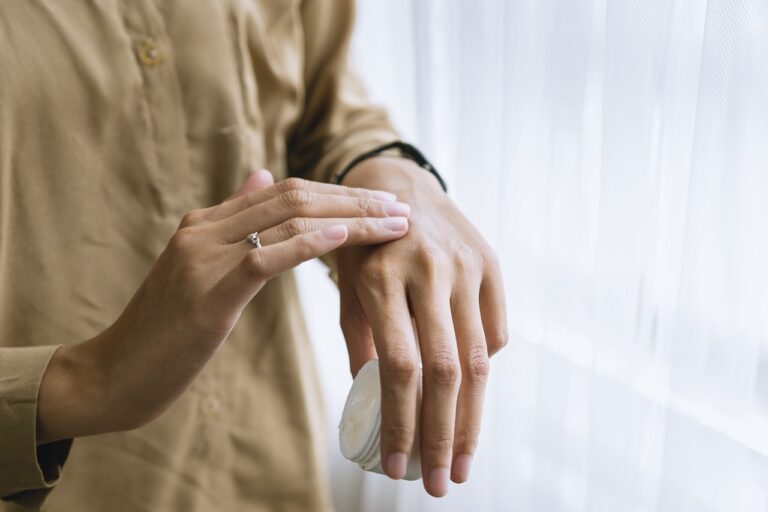Did you know that your skin can stretch almost three times its usual length when needed, such as during rapid weight gain or pregnancy?
This incredible elasticity, however, often leads to loose skin after significant weight loss—a common concern for many who have shed pounds. If you’re looking to naturally tighten your skin after shedding excess weight, there are effective and non-invasive methods to help reclaim your skin’s firmness.
Emphasizing a nourishing diet rich in vitamins and minerals, staying adequately hydrated, and engaging in strength-building exercises are fundamental. These strategies not only help improve skin elasticity but also enhance overall skin health.
By focusing on nutrition that boosts collagen, maintaining hydration, and building underlying muscle, you can gradually tighten your skin and enhance your body’s contour post-weight loss.
Can You Tighten Loose Skin After Weight Loss?
Yes, it is possible to tighten loose skin after weight loss. However, the degree of tightening you can achieve naturally depends on several factors, including the amount of weight lost, the age at which the weight was lost, the length of time the excess weight was carried, and your genetic predisposition to skin elasticity.
Here are some effective strategies that can help tighten loose skin after weight loss:
Build Muscle: Adding muscle mass through strength training exercises can fill out the skin, making it appear tighter. This is particularly effective for arms, legs, and abdomen.
Proper Nutrition: Eating a diet rich in proteins, vitamins, and minerals is essential for healthy skin. Protein supports muscle building and is vital for skin repair and rejuvenation. Vitamins such as C and E are crucial for collagen production, which enhances skin elasticity.
Stay Hydrated: Keeping your skin hydrated is vital to maintaining its elasticity. Drinking water throughout the day helps your skin stay tight and resilient.
Skin Care Regimen: Using moisturizers and products that contain ingredients like hyaluronic acid and collagen can improve skin texture and firmness. Regular exfoliation can also remove dead skin cells and increase skin regeneration.
Non-Surgical Treatments: Several non-surgical options, such as laser treatments, ultrasound therapy, and radiofrequency treatments, can increase collagen production and make the skin appear firmer.
Time: Give your skin time to adjust to your new body size. Skin elasticity can gradually improve, mainly if the weight loss has been achieved over a more extended period.
Does Taking Collagen Help Tighten Skin?
Yes, collagen supplements can help tighten skin, especially after weight loss, as collagen is a crucial protein that supports skin elasticity and strength. Collagen supplements can enhance skin hydration and elasticity, reducing sagging and making the skin appear firmer and more youthful. These supplements help maintain the skin’s structure and can improve overall skin health, including reducing the appearance of wrinkles.
Additionally, collagen is instrumental in wound healing and rebuilding skin tissues, which is beneficial for maintaining skin integrity after significant body changes. The effectiveness of collagen supplements depends on factors like supplement quality, dosage, and individual absorption rates.
It is advisable to use high-quality hydrolyzed collagen for optimal results, which the body can absorb more easily. Consuming a diet rich in nutrients supporting collagen production is also beneficial, such as vitamin C, zinc, and copper. Always consult a healthcare provider before starting any new supplement regimen to ensure it aligns with your health needs and goals
Will Losing 50 Pounds Cause Loose Skin?
Losing 50 pounds is a significant amount of weight and can potentially lead to loose skin, but the extent to which this occurs varies greatly from person to person. Several factors influence whether you’ll experience loose skin after such a weight loss:
Age: Skin elasticity decreases with age. Younger skin has more collagen and can contract better after weight loss than older skin.
Length of Time Overweight: If you’ve been overweight for many years, your skin may have lost some elasticity due to being stretched for a prolonged period.
Genetics: Some people have naturally more elastic skin than others, primarily determined by genetics.
Rate of Weight Loss: Rapid weight loss tends to cause more loose skin than gradual weight loss. Skin has a better chance to adjust to the body’s changing size when weight loss is gradual.
Nutrition and Hydration: Adequate hydration and an effective meal diet plan rich in collagen-boosting nutrients like vitamins C, E, and protein can help improve skin elasticity.
Physical Activity: Incorporating strength training into your weight loss plan can help build muscle mass beneath the skin, which can make the skin appear tighter.
Tips for How to Tighten Loose Skin

Tightening loose skin after weight loss or other changes can be a challenge, but there are several effective strategies that can help improve skin elasticity and firmness. Here are some practical tips for tightening loose skin:
Hydration: Keep your skin hydrated by drinking plenty of water. Hydrated skin tends to be more elastic and can improve the overall appearance of your skin.
Nutrition: Focus on a nutrient-rich diet that supports tightening skin health. Foods high in vitamins C, E, and A, as well as zinc and selenium, can promote collagen production and skin repair. Include plenty of fruits, vegetables, and lean proteins in your diet.
Strength Training: Incorporating strength training exercises into your routine can help build muscle mass beneath the skin, which can make the skin appear tighter. Focus on major muscle groups and vary your exercises.
Moisturize: Regular use of moisturizers that contain hyaluronic acid and collagen can help the skin retain moisture and maintain elasticity. Applying moisturizer right after a bath or shower can increase its absorption.
Exfoliation: Regular exfoliation can improve skin texture by removing dead skin cells and increasing blood circulation to the skin’s surface, which may aid in tighten skin renewal.
Avoid Harsh Sunlight: Protect your skin from excessive sun exposure, which can break down collagen and elastin, leading to looser skin. Wear sunscreen and protective clothing when outdoors.
Massage: Regular massage can increase blood flow to the skin, which may help to stimulate collagen production and tighten the skin.
Natural Remedies: Some natural remedies, such as aloe vera, cucumber, and coconut oil, are believed to improve skin elasticity due to their hydrating and healing properties. Apply these directly to the skin as part of your skincare routine.
Professional Treatments: If natural methods are not effective, consider professional treatments such as laser therapy, radiofrequency, ultrasound, or micro-needling. These methods can stimulate collagen production more deeply within the skin.
Patience and Consistency: Tightening skin naturally takes time. Consistent application of these strategies over several months can yield the best results.
Conclusion: Are Natural Ways Work To Tighten The Loose Skin?
Natural methods for tightening loose skin can be effective, mainly when consistently applied alongside a healthy lifestyle. Staying hydrated, eating a diet rich in collagen-boosting nutrients like vitamin C and omega-3 fatty acids, engaging in intermittent fasting with regular strength training, and maintaining a thorough skincare routine can all contribute to skin elasticity and firmness. These practices enhance skin hydration, support collagen production, build muscle mass beneath the tighten skin, and improve circulation, all essential for tightening skin.
The effectiveness of natural methods varies based on individual factors such as age, genetics, the extent of weight loss, and how long the skin was stretched. While these methods can offer significant improvements, those with considerable loose skin may require medical treatments for more dramatic results. Nonetheless, natural approaches are a beneficial starting point for improving skin tightness and overall health.





